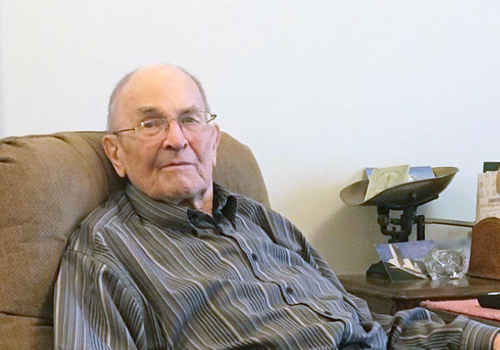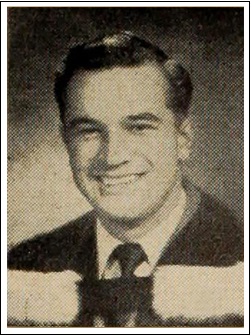A geologist, scholar, teacher and entrepreneur whose research assisted in the development of airborne gamma-ray spectrometry and satellite remote sensing, contributing to what we now know today as Google images, 94-year-old Alan Gregory, Class of 1950, Victoria College, is living safely in a seniors’ residence in Lindsay, Ontario. A diplomat-scientist who appeared before the UN, Gregory’s scholarship was used to help draft the US-Canada agreement that facilitated Canadian participation in the Earth Resources Technology Satellite (ERTS) program with NASA. These days, he loves to read his sociological and scientific magazines and journals, takes morning walks and catches up in the afternoons with his family around the world. He shares his story — and wise advice for the Class of 2020.
Has the isolation been tough on you?
The lockdown has not been tough on me because I am living the life of semi-isolation similar in some respects to that I had when I was working in the bush as a geologist. When you go out to do remote field work, you always go with a partner. On rare occasions, your partner may have to leave your base and you are left behind alone. Life in the bush can become complicated for many reasons.

In 1954, I was doing helicopter surveys over a large area in northern Manitoba. We camped in tents beside the new railroad that transected the survey area and, as needed, the ground crew moved to new campsites using a handcar loaned by the railway company. We had two aerial crews comprising a pilot and geologist and a ground crew, including a flight engineer who maintained the helicopters when they were not flying, a good cook, electronics technician for our detectors and a local handyman. The train came only once a day, but it was never on schedule. In advance of a move, the electronic technician climbed a telephone pole to connect his phone and find out when the next train was coming.
Being in the bush and having to solve problems is a good background for this lockdown. I am a bit of a loner because it gives me time to think, but my wife, Dorothy, and I enjoyed 62 happy years together with two sons, their wives, children and three grandchildren.
What are some of your favourite memories of your time at U of T?

I have great memories of my engineering courses and activities at the School of Practical Science (SPS), which I attended before I received a bursary to study chemical engineering in SPS. After a summer doing assays every day, I switched over to geological sciences at Victoria University. I participated in arts and culture with the stage crew for one year at Victoria. I joined the track and field teams of both faculties and received athletic colours from both faculties. I was a good athlete right from the start and, as a member of the U of T team, helped to set a new Canadian record for the mile relay at 91st Highlanders’ International Indoor Track Meet in Hamilton, in March of 1946. In the winter, we used the indoor track at Hart House for both practice and races. I enjoyed Hart House for meals and making friends, lifelong friends, including with some staff. When I graduated in 1950, I received two academic medals from U of T: the Coleman Gold Medal and Victoria College’s Regent’s Gold Medal.
My education at U of T Victoria set me off on a path that led to my PhD, and into a long career in remote sensing with NASA satellites. The satellites came to the world through NASA, safely, after scientific advisers at the United Nations, including me as a Canadian diplomatic scientist, debated and allayed the concerns of some opposing powers.
What was your proudest career achievement?
The creation of the Canada Centre of Remote Sensing (CCRS) together with other scientists and engineers in government and industry. I became a consultant for Dr. Larry Morley, who was the designated director of CCRS and a superb research leader. During the creation stage, Dr. Morley and I served as Canadian representatives on the UN Committee on Space Affairs and the UN Working Group on Remote Sensing for about four years, while we both lived in Ottawa with our families. We were proud of our part in the subsequent launch of NASA resource satellite ERTS-1 on a global path with international accord in 1973.
As the satellites began producing images from space, they launched another career, that of analyst who could provide meaning of both the Return Beam vidicon photographic images and the four channel Multispectral Scanner radiometric images. Scientists in many countries had planned in advance of the first images of forests, water, floods, ice in water, snow on land, etc. My wife Dorothy, as treasurer and bookkeeper, and I founded Gregory Geoscience Limited in Ottawa, a consulting company. We eventually had about 20 analysts working with us. We developed an optical instrument (ProCom-2) to help with analysis and sold them until digital analysis became more useful. We also were staffing the CCRS library of remote sensing literature under the direction of the librarian. We sold the company and retired in 1990. [Editor’s note: Gregory Geoscience was at one time the largest user of ERTS/LANDSAT images, according to NASA and CCRS data.]
How do you feel to see your work contributed to the rise of Landsat/Google images?
Very proud — I'd be lying if I said I wasn’t.
What advice do you have for the Class of 2020?
COVID-19 has changed the lives of everyone forever. Life will never be the same as when you were kids. Do not give up hope. We can remain together as Canadians, as we are doing better than most countries in the world. We will flatten the virus curve, maintain a strong national economy and improve our good health care. There are many challenges upon which you graduates should employ your energy, ideas and new technology. So here are some thoughts for you:
- Love your choice of career.
- Do your best always.
- Be enthusiastic in your approach to work and to life in general.
- Realistically assess your capabilities.
- If you do not have a job, start building a network of friends & associates who may provide info on available jobs.
- Consider where you wish to be in the future, a job in Canada, in the U.S. or overseas.
- Research the history, management and staff of any organization you wish to join.
- Carefully consider later wishes to change your career. A career change can be exhilarating! I had about six careers after graduating as a geologist, e.g. researcher in Ottawa, diplomatic scientist in meetings at the UN.
- Solve the problems of the environment and you will help save humanity in a world of greater equality and peace.
That is a heavy load, but I am sure you can find a happy life doing your part.

